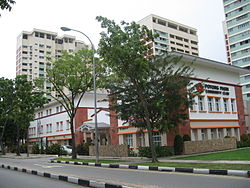Potong Pasir
| Potong Pasir | |
|---|---|
| Name transcription(s) | |
| • Chinese | 波东巴西 |
| • Pinyin | bōdōng bāxī |
| • Malay | Potong Pasir |
| • Tamil | போத்தோங் பாசிர |

Potong Pasir Community Club in Potong Pasir
|
|
| Country |
|
Potong Pasir is a housing estate located between Toa Payoh and Sennett Estate in the North-East Region of Singapore. For urban planning purposes, it is classified under the Toa Payoh area. Potong Pasir is particularly notable for being the longest-held opposition ward in one-party dominant Singapore. Its Opposition Member of Parliament Chiam See Tong held the ward from 1984 to 2011. Potong Pasir is easily accessible by the MRT station.
In 2011, the ward, led by Mrs. Lina Chiam, was lost to 3-time challenger Sitoh Yih Pin in what was the slimmest of margins of 114 votes; with 242 votes rejected. Mr. Chiam See Tong led a team of 5 to contest in the Bishan-Toa Payoh Group Representation Constituency (GRC) during that General Elections.
From 1910 to 1937, it was dominated by sand-quarries, hence giving it its present name, which means 'cut sand' in Malay. These mining activities created four ponds linked to the Kallang River, although they were reduced to two due to massive flooding in 1968. The ponds provided a good source of food for the local village folk, until pollution set in later.
In the mid 1950s, Potong Pasir was one of the most important vegetable growing areas in Singapore. The land here had been cultivated since the 1830s. The farmers there were almost all Cantonese and they used traditional methods with great success.
Leafy vegetables were grown on farms located in lowland areas such as Potong Pasir, Changi, Ponggol, and Sembawang. Watercress was the most important type of vegetable grown in Potong Pasir. A small portion of farmland was used for planting coconut palms.
Vegetable farming in Singapore was a family business. Farmers of Potong Pasir lived in attap houses, in zinc roof and semi-concrete houses. The general condition of the rural roads was poor. Most farmers in the area leased their land from the Government.
...
Wikipedia
